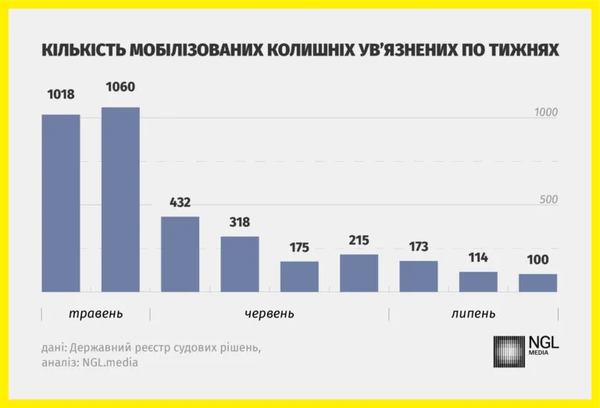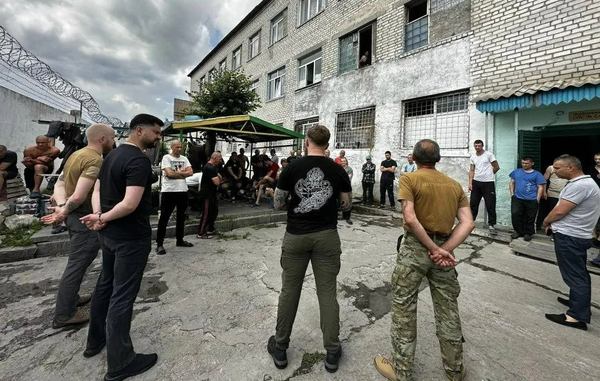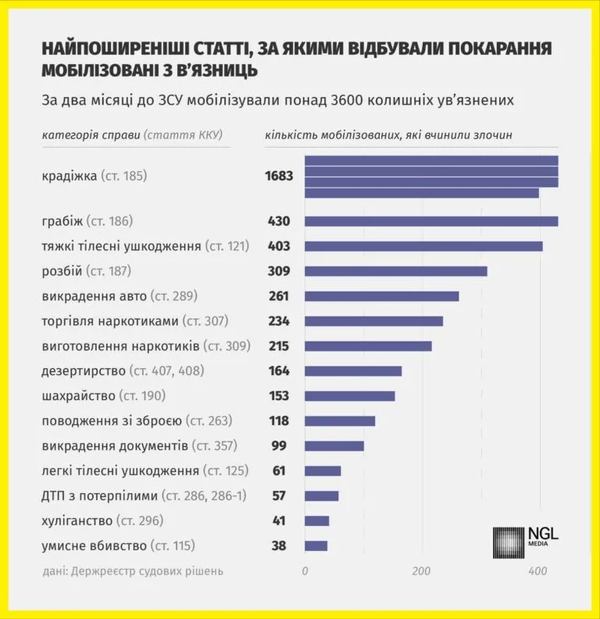Большинство заключенных (но не все) получили возможность служить своей Родине с оружием в руках.
49-летний харьковчанин Вячеслав Синявский отсидел в тюрьме почти половину своей жизни — около 23 лет. Его неоднократно судили за кражи, хулиганство, разбой, бандитизм, хранение наркотиков и даже побег из-под стражи. В июле 2022 года он снова попал за решетку на четыре года за грабеж.
Вячеслав Синявский стал одним из почти четырех тысяч осужденных, которые воспользовались правом на условно-досрочное освобождение (УДО) в обмен на добровольную мобилизацию в боевые части ВСУ.
В издании NGL.media проанализировали несколько тысяч судебных постановлений, чтобы понять, кто эти люди.
КАК ЖУРНАЛИСТЫ ЭТО СДЕЛАЛИ?
Согласно закону, осужденных освобождают по статье 81-1 УКУ. Используя поисковый термин «81-1» за период с 18.05.2024 до 24.07.2024, получили более 6000 документов в судебном реестре, которые в целом подпадали под наш запрос. После повторного машинного и ручного анализа забрали повторы и документы, которые не касались условно-досрочного освобождения. В результате осталось 3611 судебных постановлений об условно досрочном освобождении в обмен на заключение военного контракта, которые выборочно проанализировали. Еще в 47 случаях суд отказался освобождать осужденных, которые изъявили желание служить в ВСУ.
Освобождение в обмен на военную службу стало возможным в мае — после вступления в силу нового закона. Большинство заключенных (но не все) получили возможность служить своей Родине с оружием в руках. Кроме личного желания воевать, им нужно еще получить разрешение суда и администрации тюрьмы, а также согласие командира конкретного воинского подразделения.
Проведенный NGL.media анализ судебного реестра показывает, что за два месяца такой возможностью уже воспользовались 3611 осужденных. Это более 13% от общего количества заключенных в украинских колониях. В целом правительство рассчитывает на мобилизацию не менее 4 тыс. осужденных, ранее заявлял министр юстиции Денис Малюська. Это фактически полноценная отдельная бригада ВСУ.

Больше половины освобождений пришлось на последние две недели мая, когда закон только вступил в силу. В июне и июле динамика значительно снизилась, однако озвученная министром цифра уже почти достигнута — и только за два месяца.
40% ранее судимых
Если анализировать характер преступлений, совершенных уже бывшими заключенными, то абсолютное большинство из них были осуждены за кражи, грабежи, разбои или тяжкие телесные повреждения — в том числе и повлекшие смерть потерпевшего. Почти все они будут служить исключительно на стрелковых должностях. Судя по судебным постановлениям, лишь несколько уволенных будут служить санитарами, поварами или водителями.
Данные анализа NGL.media свидетельствуют, что 40% этого контингента — это неоднократно судимые лица. Это достаточно весомая доля, поскольку в целом среди осужденных доля ранее судимых последние несколько лет составляет 25-26%.
Одним из типичных примеров является 35-летний Дмитрий Страшников с Харьковщины, приговоренный к пяти с половиной годам тюрьмы за кражу. Ранее его уже неоднократно судили за аналогичные преступления. В целом он провел в местах лишения свободы почти 16 лет, а впервые был осужден в 15-летнем возрасте.
Служить решил и 50-летний Андрей Серов из Днепропетровской области, который отсидел в колониях и тюрьмах около 26 лет. Ранее его судили за умышленное убийство, хранение огнестрельного оружия, разбой и кражи. А в последний раз он был осужден за мошенничество и угон авто.
Как работает закон
Конечно, не каждый заключенный имеет право выйти на свободу для службы в армии. Во-первых, надо быть годным к службе, что должна подтвердить военно-врачебная комиссия (ВВК). Во-вторых, запрещено освобождение осужденных за ряд тяжких преступлений. Не могут воспользоваться правом на условно-досрочное освобождение и те, кто занимал особо ответственное положение — например, депутаты или чиновники.
КАКИХ ОСУЖДЕННЫХ ЗАПРЕЩЕНО МОБИЛИЗОВАТЬ?
Не могут быть досрочно освобождены для мобилизации осужденные за преступления против основ национальной безопасности, терроризм, убийство или покушение на убийство представителя правоохранительного органа, умышленное убийство двух или более лиц, убийство с особой жестокостью или соединенное с сексуальным насилием, все преступления сексуального характера, особо тяжкие коррупционные преступления, ДТП в состоянии алкогольного или наркотического опьянения, повлекшее гибель двух и более лиц. Также не имеют права на увольнение независимо от преступления те, кто согласно подпункту 1 пункта 3 примечания к статье 368 УКУ занимал особо ответственное положение (депутаты, министры, заместители министров и т.д.).
В случае разрешения суда на мобилизацию, заключенного условно-досрочно освобождают только от основного наказания в виде лишения свободы. Однако другие ограничения — например, лишение права управлять транспортом или занимать определенный тип должностей — остаются в силе.
Также к ним применяются определенные ограничения. Например, они не имеют права на ежегодный отпуск, однако могут получить до 10 дней отпуска по семейным обстоятельствам или после заключения ВВК на время лечения. Также суд устанавливает в отношении них дополнительный административный надзор, осуществлять который должен командир воинской части. Контракт с бывшими заключенными заключают до окончания военного положения — это главное условие досрочного освобождения.
Стоит заметить, что за уклонение от заключения контракта им грозит наказание от 5 до 10 лет лишения свободы, тогда как общая ответственность за уклонение от мобилизации предусматривает 3-5 лет лишения свободы.
Где они будут служить? Сейчас четко определенного алгоритма нет. Ранее представитель Минобороны Дмитрий Лазуткин утверждал, что бывшие заключенные будут служить в отдельных специальных подразделениях. Однако, например, в Третьей штурмовой бригаде ВСУ этих людей решили интегрировать в уже существующие взводы.
Какова процедура мобилизации заключенных
Заместитель министра юстиции Елена Высоцкая рассказала NGL.media, что основной предпосылкой этого процесса является личное желание осужденного. «Только после того, как он изъявил желание, начинаются все остальные процессы — это подготовка документов, собеседование с командирами и ВВК», — говорит она.
По словам Высоцкой, когда в колонии набирается определенное количество желающих мобилизоваться, туда приглашают представителей различных бригад, которые рассказывают об особенностях службы. При этом осужденные имеют возможность выбрать свое место службы. В случае, если командир бригады все же откажется брать конкретного осужденного, он будет ждать в колонии, пока его не согласится взять кто-то другой.

В суд ходатайство о мобилизации осужденного попадает только тогда, когда он смог пройти все этапы: написал заявление, получил согласие администрации колонии, прошел ВВК, получил согласие командира, который предварительно уже ознакомлен с личным делом осужденного.
Получив разрешение суда, осужденный едет в воинскую часть, где заключает контракт, после чего начинается процесс его военной подготовки.
«После решения суда [о разрешении мобилизоваться] это уже свободные люди, единственным ограничением для них является контракт до конца военного положения», — говорит Елена Высоцкая.
По оценке секретаря комитета Верховной Рады по вопросам национальной безопасности Романа Костенко, таким образом уже мобилизовано около 3800 осужденных. В судебном реестре сейчас опубликованы 3611 постановлений об освобождении.
Кто-то передумал в последний момент, кому-то запретил суд
Иногда, хоть и нечасто, суды отказывают осужденным в их желании присоединиться к ВСУ. NGL.media пока обнаружили только 47 таких случаев, причем в 23 случаях они сами передумали мобилизоваться. Такие осужденные продолжают отбывать наказание.
Зато в еще 24 случаях именно суды отказали в условно-досрочном освобождении. Причины разные — например, осужденный не прошел психологический отбор, или ВВК признала его пригодным только для службы в тылу, или же осужденный вообще не имеет права на такое освобождение. Так суд отказал Андрею Ларченко с Сумщины, который отбывает наказание за развращение несовершеннолетнего — такая категория заключенных не может быть мобилизована.
Среди проанализированных журналистами 24 отказов особенно выделяется судья Дзержинского райсуда Кривого Рога Наталья Литвиненко, которая отказала 11 осужденным и — хотя они имели все необходимые разрешения и не были в списке ограниченных к мобилизации.
Например, она отказала в мобилизации Александра Кошелева из Днепропетровской области, который отбывает наказание за убийство собственного отца. «ВСУ при выполнении боевых задач — это слаженный коллектив, где бойцы рассчитывают друг на друга, а не место для перевоспитания», — пояснила свою позицию судья.
Однако прокуратура подала апелляционную жалобу на это решение, которую удовлетворили. По мнению судей Днепровского апелляционного суда, основания отказа были недостаточными, поскольку существует общественный интерес в сохранении государственности, а значит есть преимущество в вопросе защиты Отечества и его территориальной целостности над негативными сведениями об обвиняемом.
Наталья Литвиненко также отказала в мобилизации Владиславу Ковалю из местной исправительной колонии, который систематически нарушает внутренний режим колонии, отказывается от работы и вообще пытается занять определенное положение в преступной иерархии. На это решение прокуратура также подала апелляционную жалобу, решения по ней пока нет.
Стоит заметить, что в случае отказа суда в ходатайстве о мобилизации осужденного, новое заявление он может подать только через три месяца со дня отказа.
Убивали и пытали
Право на мобилизацию имеют и заключенные за одно убийство и . А значит такой возможностью смог воспользоваться 44-летний Александр Грякало, который был приговорен к 9 годам лишения свободы за убийство своей девушки в мае 2020 года. Тогда он в нетрезвом состоянии просто забил ее до смерти.
В суде Грякало не признал вины в убийстве, хотя ранее уже неоднократно применял силу к девушке и был за это осужден в 2019 году на три года испытательного срока.

Также правом на мобилизацию воспользовался и Михаил Ковтун из Винницкой области, приговоренный к 9 годам за убийство собственной матери. Как установил суд, он неоднократно применял насилие к матери и в результате очередного избиения в октябре 2021 года она умерла.
В общем правом на условно-досрочное освобождение в обмен на мобилизацию воспользовались уже 38 осужденных по ст.115 УК (умышленное убийство).
Под ограничения не попадают и заключенные за пытки. Так, например, 32-летний Александр Трубач из Сумской области, который отбывал наказание за пытки человека, будет служить в ВСУ. В декабре 2018 года он еще с несколькими сообщниками издевался над двумя мужчинами, один из которых в результате погиб. Как установил суд, Трубач снимал издевательства на видео, а также всячески поддерживал действия своих сообщников.
Еще один осужденный за пытки, Павел Сидоренко из Полтавы, также пойдет служить в ВСУ. В феврале 2023 года он совместно с товарищем связали и жестоко избили потерпевшего, потому что тот отказался пить с ними спиртное.
Военные возвращаются к службе
Правом на мобилизацию воспользовались и некоторые бывшие военные, которые попали за решетку. Например, снова будет служить бывший пограничник, 22-летний Василий Ставила, который в июне 2021 года дезертировал с оружием. Позже в суде он объяснял свои действия психологическими проблемами из-за разрыва со своей девушкой.
Тем же способом мобилизовался и 28-летний Андрей Приступа из Ровенской области, который во время службы в ВСУ в августе 2022 года нетрезвым сбил мотоциклом насмерть ребенка в одном из сел Ровенской области. Суд установил, что Приступа страдает алкогольной зависимостью, накануне трагического ДТП он даже лечился в стационаре из-за психических расстройств вследствие употребления алкоголя. Его зависимость подтвердил и командир воинской части, где служил Приступа. В результате его приговорили к 8 годам лишения свободы.
Интересно, что служить стремятся и осужденные за уклонение от мобилизации — всего мы обнаружили десять таких новобранцев. Например, такое разрешение получил Александр Романец из Винницкой области, осужденный в октябре прошлого года к трем годам лишения свободы.
Пойти в армию решили и семеро осужденных за незаконную переправку людей через границу — в частности, осужденный за такое преступление на 5 лет Денис Дони из Одесской области. В июне прошлого года он вместе с сообщником пытался переправить трех уклонистов в Молдову, но неудачно.
Почти отбыли наказание, однако идут в ВСУ
Среди проанализированных NGL.media дел встречались случаи, когда осужденный уже почти отбыл свой срок, однако сознательно решил пойти служить. Например Иван Лысый с Полтавщины, которому оставалось сидеть за кражу чуть больше двух месяцев не ждал конца срока и пошел в ВСУ. Или другой осужденный за грабеж Роман Хоменко с Черниговщины также решил не ждать освобождения и мобилизовался, хотя до окончания срока ему осталось всего четыре месяца.
Однако мобилизуются также люди, тюремный срок которых только начинается. Например, желание служить изъявил и неоднократно судимый за кражи 53-летний Андрей Пастушок с Харьковщины. Из своего свежего пятилетнего срока он успел отсидеть чуть больше двух месяцев. Еще одним примером является Ярослав Жегистовский из Черновцов, который из пяти лет за кражу отсидел чуть больше пяти месяцев.
NGL.media не удалось связаться хотя бы с кем-то из бывших осужденных. Зато мы смогли поговорить только с сестрой мобилизованного Ивана Лысого, ранее осужденного за кражу. Его родная сестра даже не знала, что он уже вышел на свободу и служит в ВСУ.
Проанализированные NGL.media данные свидетельствуют, что среди мобилизованных осужденных есть и женщины, хотя и немного. Так получила разрешение на мобилизацию Оксана Нестер из Ровно, осужденная за грабеж. Также мобилизована львовянка Ольга Мацюк, которая отбывала наказание за довольно странную кражу. В мае 2022 года она украла электронный браслет у своего сожителя, который находился под круглосуточным домашним арестом, и продала за 200 грн на рынке. В приговоре указано, что у Мацюк диагностированы расстройства психики из-за употребления алкоголя.
Какие есть риски и как с ними будут бороться
В процессе мобилизации осужденных есть определенные риски, в частности такой мобилизованный может сбежать из воинской части, или совершить новое преступление, уже находясь на военной службе.
NGL.media спросили заместителя министра юстиции Елену Высоцкую, могут ли таких людей мобилизовать повторно. «Процедура такой мобилизации является универсальной, пока она не имеет оговорок к таким осужденным, но и пока у нас не было таких случаев», — отметила Высоцкая.
Однако определенные предохранители, по ее словам, все же существуют. В частности, в повторной мобилизации может отказать суд, администрация колонии или командир, ведь они будут понимать, что такой человек уже нарушил нормы условно-досрочного освобождения.
«Этот закон в первую очередь о праве осужденного во время войны присоединиться к рядам ВСУ, мы не углублялись, что осужденные обязательно нарушат условия УДО и повторно захотят пойти служить», — пояснила Елена Высоцкая.


